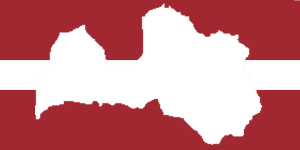By Sarah-Claire Jordan
 Latvia is a northern European country that is one of the Baltic states, the two others being Estonia and Lithuania. Russia borders it on the east, and Sweden sits across the Baltic Sea from Latvia to the west. The indigenous groups of Latvia consist of Livs and Latvians, though there are many citizens who are originally from other countries such as Russia, Ukraine, Poland, and more. Thus, the official and unofficial languages of those countries are also spoken in Latvia, but the indigenous languages of the country are very interesting.
Latvia is a northern European country that is one of the Baltic states, the two others being Estonia and Lithuania. Russia borders it on the east, and Sweden sits across the Baltic Sea from Latvia to the west. The indigenous groups of Latvia consist of Livs and Latvians, though there are many citizens who are originally from other countries such as Russia, Ukraine, Poland, and more. Thus, the official and unofficial languages of those countries are also spoken in Latvia, but the indigenous languages of the country are very interesting.
The Language of the Land
Latvian is, as you could probably tell, the official language of Latvia. It is also the only official language of the country and one of three indigenous languages still spoken today in Latvia. It is an Indo-European language in the Eastern Baltic group, and is spoken by around 1.3 million people natively, with 80% of the population of Latvia speaking it. It is also spoken in other countries as a native language by some 100,000 people or more. Latvian’s closest linguistic relative is Lithuanian, and there are three different dialects of Latvian that are spoken in different regions of the country. Interestingly enough, there are more Latvian speakers who speak it as a second language than those who speak it natively.
The Possible Dialect
The Latgalian language is very similar to Latvian, which leads many people to think that maybe it is just a dialect of Latvian. However, it is officially considered a variety of Latvian, which is a bit different from being considered a dialect of it. It is also an Eastern Baltic language, and was originally spoken by the Latgalian tribe who lived in regions of Latvia now known as Latgale and Vidzeme. The first writings in Latgalian used an orthography system also used for Polish, and were written using Antiqua text. Today, about 150,000 people speak Latgalian, and it has some support from the government. However, it isn’t used as a teaching language or for any official purposes anymore.
The Dying Language
The last of the indigenous languages of Latvia is facing an unfortunate fate. The last native speaker of the Livonian language (not to be confused with the Livonian dialect of Latvian) died in 2013, making the language officially moribund. Livonian is a Finnic language of the Uralic family, meaning it has more in common with Finnish than with Latvian. It is the language of the Livonian ethnic group, but most Livonians don’t use it since there aren’t many opportunities to do so. The decline of the language could have been caused by many things, but even in the 13th century there were only around 30,000 native speakers. Many ethnic Livonians have tried to revive the language, learning it and teaching others, but without a native speaker to carry the torch, the fate of Livonian is entirely in the hands of a new generation of non-native speakers.
For an overview of our translation expertise, visit our audio and video translation service page.



